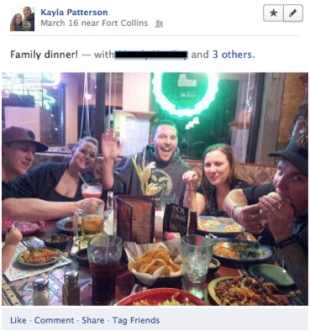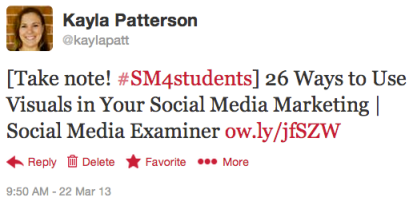People ask me all the time how they can get experience working in social media, and while there are a variety of answers, I thought I’d offer up five ways that I would suggest gaining such experience.
 1. Set up your own accounts.
1. Set up your own accounts.
While I hope that this would be a given, I’m surprised at how many students want to work in social media, but don’t even have a personal Twitter account. Therefore, one of the best ways you can increase your knowledge of social media channels is to leverage them for yourself. Not only will you learn how to use each channel, and discover the unique features of each, but you can then position your own channels to market yourself for jobs. And coming from someone who has hired and recruited social media interns and community managers, having an impressive and professional online presence is very important. I’m not keen to hire you if I can’t even find you online.
2. Offer to manage accounts for a small business or student org.
This is actually how I started getting experience in social media. Find a family member or friend who has a small business, and volunteer to manage their social media presence. Don’t expect to be paid, just do your best to practice developing a strategy, maintaining their accounts, and measuring results. If you can’t find an opportunity, try to create one. Get involved with a student organization on campus, or perhaps an office on campus, that is struggling with their social media, and offer your help. Once you do this, make sure to showcase your experience on LinkedIn and get a recommendation from whoever you worked with.
3. Look for a social media internship.
With social media becoming more and more influential in the business world, thousands of companies are jumping on the bandwagon, so to speak, and seeking help with their social media. Larger companies are most often already in the game, and looking for seasoned social media professionals, but small businesses just need some help. Although many of these smaller internships are unpaid, there are many where you can work remotely, and require minimal hours per week. Look for one of these and apply! Here are some resources to look for internships:
4. Take advantage of unique opportunities.
 Besides a traditional internship, there are other unique opportunities that are popping up all over the web. One such opportunity is the HootSuite Campus Ambassador program. Once accepted in this program, you assume a role on your campus in which you help promote the many uses and functions of HootSuite and social media. Not only do you gain invaluable experience, but you also get to add a well-known and reputable company to your network and resume. Read more about my involvement with this program here: A Hoot-Tastic Opportunity.
Besides a traditional internship, there are other unique opportunities that are popping up all over the web. One such opportunity is the HootSuite Campus Ambassador program. Once accepted in this program, you assume a role on your campus in which you help promote the many uses and functions of HootSuite and social media. Not only do you gain invaluable experience, but you also get to add a well-known and reputable company to your network and resume. Read more about my involvement with this program here: A Hoot-Tastic Opportunity.
5. Follow SocialMediaForStudents.com.
Ok, so this might seem like an obvious plug, but I’ve worked hard to include many helpful resources, tips, and interviews on this site to help students of social media learn how to develop their knowledge and skills. For example, make sure you check out the Social Media Marketing 101 page for ideas on how to navigate all of the information about social media, as well as the Important Links page for blogs and sites to follow. To make sure you stay on track, subscribe to SMFS by email through the field in the sidebar!
Do you have questions? Other tips to share? Please add them in the comments!








